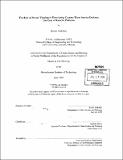| dc.contributor.advisor | Jennifer Davis. | en_US |
| dc.contributor.author | Abdullah, Roohi, 1970- | en_US |
| dc.contributor.other | Massachusetts Institute of Technology. Dept. of Urban Studies and Planning. | en_US |
| dc.coverage.spatial | a-pk--- | en_US |
| dc.date.accessioned | 2011-05-23T17:50:01Z | |
| dc.date.available | 2011-05-23T17:50:01Z | |
| dc.date.copyright | 1999 | en_US |
| dc.date.issued | 1999 | en_US |
| dc.identifier.uri | http://hdl.handle.net/1721.1/62941 | |
| dc.description | Thesis (M.C.P.)--Massachusetts Institute of Technology, Dept. of Urban Studies and Planning, 1999. | en_US |
| dc.description | Includes bibliographical references (leaves 84-85). | en_US |
| dc.description.abstract | The private water vending industry in Karachi is an important source of water service delivery in Karachi, Pakistan. Water vending is largely a supplemental service to households with private water connections, due to limited service from the public utility. This research attempts to: i) Characterize the existing water supply situation in Karachi, with particular focus on the water vending industry; ii) Evaluate the extent to which water vending in Karachi affects households' water supply situation and generates excessive profits for vendors; and iii) Assess possible strategies for water sector reform in Karachi. The case of Karachi, where water vending coexists with a piped supply network, poses a challenge to policy makers in water supply planning. The study shows that the major clients of vended water in the city are those who have water connections, storage capacity, and the ability to buy water. The key findings of the study are: i) Karachi's water vending market may not be economically efficient. Although the vending market provides only 9% of the water consumed by city residents on a daily basis, it earns almost 50% of all revenues received from water. ii) Groundwater supplying households' wells and private hydrants is not recognized as a common property resource by the concerned public agencies. As a result, existing government policy fails to address the consequences of unregulated groundwater use by private individuals. iii) Surprisingly, a market for vended water exists even in a city where more than 3/4 of all households are served by piped water connections. When levels of the public utility's service are low - in this case an average of 3 hours of service each day - households are forced to turn to other sources to meet their water supply needs. In view of these findings, there appears to be a need for regulatory reforms. The study proposes the adoption of a dual strategy to solve the problem of rent seeking by hydrant owners in Karachi: regulation, and promotion of competition. | en_US |
| dc.description.statementofresponsibility | by Roohi Abdullah. | en_US |
| dc.format.extent | 123 leaves | en_US |
| dc.language.iso | eng | en_US |
| dc.publisher | Massachusetts Institute of Technology | en_US |
| dc.rights | M.I.T. theses are protected by
copyright. They may be viewed from this source for any purpose, but
reproduction or distribution in any format is prohibited without written
permission. See provided URL for inquiries about permission. | en_US |
| dc.rights.uri | http://dspace.mit.edu/handle/1721.1/7582 | en_US |
| dc.subject | Urban Studies and Planning. | en_US |
| dc.title | The role of private vending in Developing country water service delivery : the case of Karachi, Pakistan | en_US |
| dc.type | Thesis | en_US |
| dc.description.degree | M.C.P. | en_US |
| dc.contributor.department | Massachusetts Institute of Technology. Department of Urban Studies and Planning | |
| dc.identifier.oclc | 44042569 | en_US |
